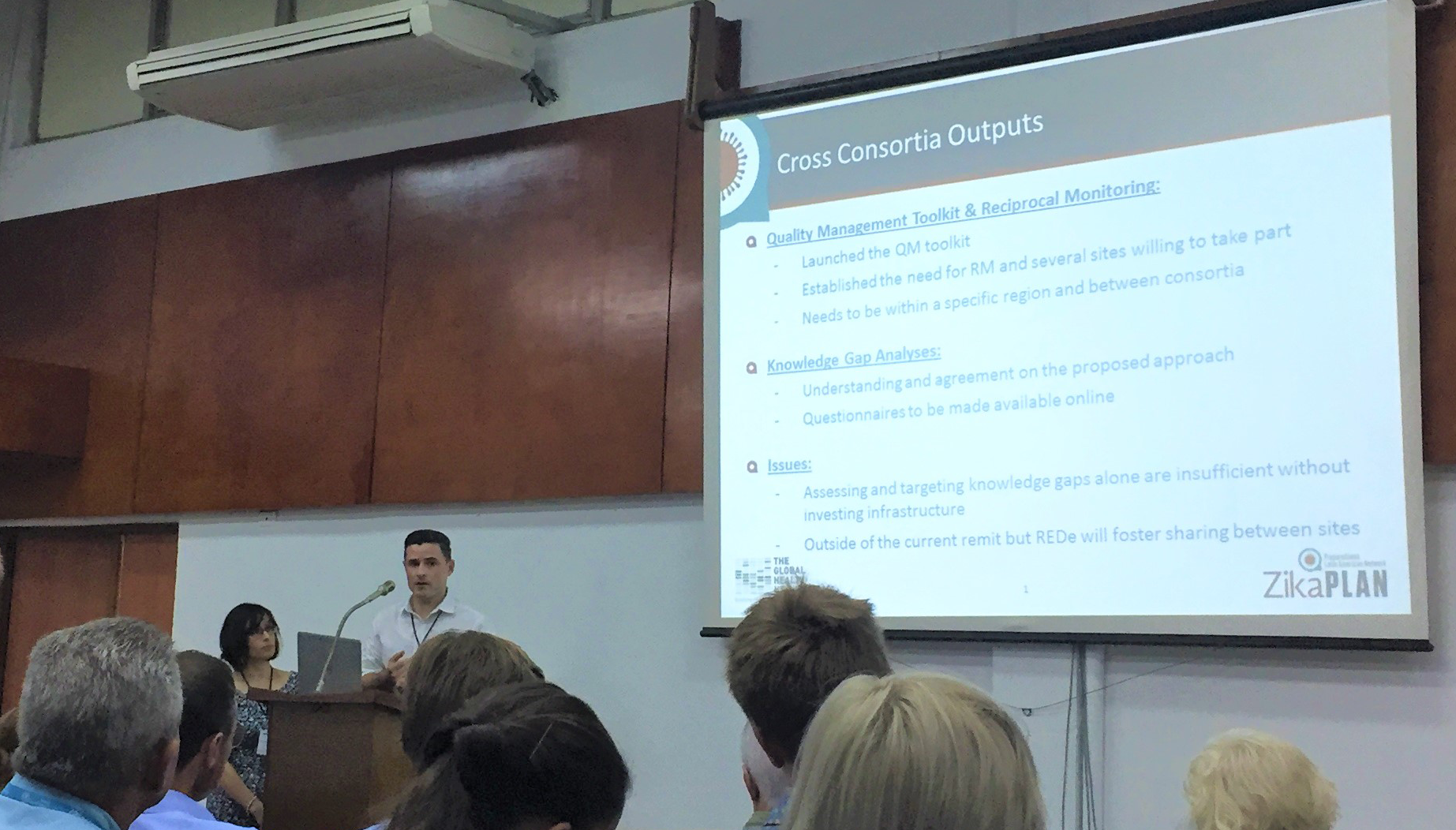
This article is part of the network’s archive of useful research information. This article is closed to new comments due to inactivity. We welcome new content which can be done by submitting an article for review or take part in discussions in an open topic or submit a blog post to take your discussions online.
Name of conference: REDe / MERG / ZIKAlliance Clinical Cohort Studies Breakout Session
Aim of conference: Introduce the theory of reciprocal clinical monitoring
Date of conference: Havana 12 – 14 August 2017,
REDe is the research capacity network that is being established through a single work package that is common and runs across all three EU funded Zika consortia (ZIKAction, ZIKAlliance and ZikaPLAN). The aim of REDe is to link together and work with experienced and inexperienced research sites across Latin American and the Caribbean to deliver knowledge, research tools and training. This is to assure that quality standardised data can be collected through the consortia’s studies and then aims to leave a lasting capacity to undertake locally led clinical and laboratory research that would enable the region to respond in the event of a future outbreak.
All studies on human subjects should have an assured level of quality to protect the rights of the participants and to ensure data are reliable. Nina Jamieson, REDe Coordinator, launched the ‘REDe scheme for assuring data quality and introduced reciprocal monitoring’. It was an extremely productive session, as representatives from MERG (ZikaPLAN), REDe and the ZIKAlliance clinical cohort studies met to focus on applying the concepts at their sites.
The toolkit has been designed to respond to the challenge of how to implement reciprocal monitoring from a more pragmatic approach, that is applying it to trials on registered products, non-drug trials, observational/or sampling studies. There is often a misconception to trial monitoring and quality assurance being perceived difficult, as most people’s experience has been industry led drug monitoring.
The Quality Management Toolkit includes:
1. What is Quality Management and why is it important for clinical data
2. How to assess and risk and identifying possible errors
3. How to write Quality Management Plan (QMP) for your study
4. The templates and Standard Operating Procedures (SOPs) required to help with quality management
5. An Assessment Form to conduct a risk and complexity to decide on the type of approach to monitoring you may need
6. Guidance on ‘What is Reciprocal and in-house monitoring and how that can help studies in low resources areas.’
What are the benefits of implementing reciprocal monitoring?
- Compared with industry led drug monitoring, this system is easy to set up and low cost: Training materials are available online, with shared online / distance learning modules being launched on REDe at a later date
- It provides an opportunity to gain research skills for clinical staff
- Best practice is shared amongst research sites i.e. hospitals, and the standard of conducting research is raised, building reputations, both at the local research site level and beyond!
- It can be implemented within a hospital, research centre or across the consortia – sharing knowledge across different research teams, within regional boundaries
As part of the Work Package entitled ‘to establish reciprocal clinical monitoring platform effort to assure data quality across clinical trials’, REDe would like to support the training and development of trial monitors in the field, and to facilitate the implementation of reciprocal monitoring.
REDe is inviting all members participating in the prospective cohort studies to get in touch for further discussion on receiving support for the training and development of monitors.
REDe will help you connect with other monitors and work through the training curricula.
If you are interested please email: REDe@theglobalhealthnetwork.org
To download the Quality Management Toolkit Click Here
To conduct a risk and complexity assessment to decide on a monitoring or quality management approach for your clinical study Click Here
Also By
- DNDi short film about new treatment for sleeping sickness awarded Grand Prix at inaugural WHO film festival
- Survey launched to establish what research funders should prioritise for COVID-19
- Better Research for Better Health: University of Oxford and Fiocruz partner to improve health research and capacity development globally
Useful Resources
Related Articles
-
Institutional maternal and perinatal deaths: a review of 40 low and middle income countries
BY Bailey et al -
Zika virus in asymptomatic blood donors in Martinique
BY Gallian et al. -
Antimicrobial Resistance and Immunisation
BY Authors: Sarah Bunn; Catherine Hall -
Biological Informatics Research Training in Health
BY M. Lesosky, C. Reddy -
The International Stroke Trial database
BY Peter AG Sandercock, Maciej Niewada, Anna Członkowska, the International Stroke Trial Collaborative Group
